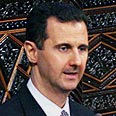
Assad: Israel rejecting peace
Arab Summit in Syria off to medial start as only 11 Arab League leaders accept Syrian President Bashar Assad's invitation to attend Damascus gathering. 'Syria believes in peace, Israel not interested' he says
Syria believes in a comprehensive, just peace, Syrian President Bashar Assad said Saturday, in a speech opening the Arab Summit in Damascus.
Syria played host to the summit, entertaining the leaders of Algeria, the Comoros, Kuwait, Libya, Mauritania, the Palestinian Authority, Qatar, Sudan, Tunisia and the United Arab Emirates in Damascus.
"We accepted the Arab peace initiative in 2002, but Israel responded by invading the West Bank and killing women and children… (Israel) has built more and more settlements as well as the racist separation fence, pushing the region to extremes."
Syria has reached out to Israel during the Annapolis peace conference, continued Assad, "but again (Israel) rejected it... we have to ask – is it right for us to keep offering unconditional peace initiatives, if they continue to hear only what they want, ignoring what they don't want to hear?
"Israel have proven, every chance it got, that is not interested in peace; and has done so in front of the whole world," he added. "The world is doing nothing, all for the sake of 'Israel's safety'. We must stress – no security can be guaranteed unless through peace… and peace will come only after (Israel) withdraws from occupied Arab lands."
Attending the summit were only half of the Arab League's 22 member states, as the rest – blaming Syria for the political crisis in Lebanon – boycotted the event.
The absence of Arab League powers such as Saudi Arabia, Egypt, Jordan and Lebanon is an embarrassment to Assad, whose government had hoped the summit – billed as "the summit of joint Arab action" – would boost its prestige.
A widening rift
Syria's months-long efforts, both politically and infrastructure-wise to launch a successful even paled, as in an unprecedented move, eight countries have sent only junior officials, rather than their heads of state, or even their prime ministers.
Egypt's delegation was headed by its parliamentary affairs minister, while Saudi Arabia's and Jordan's were headed by their Arab League ambassadors.
Lebanon is banning the summit completely – the first time an Arab country has refused to send a delegation since Arab leaders began holding annual summits in 2000.
The boycott is aimed to show Damascus the diplomatic cost of its hard line on Lebanon and the Israeli-Palestinian conflict; but it may strengthen Damascus' alliance with Iran and the Hamas and Hezbollah militant groups, instead.
"We are all in the same boat in this storm and all we can do now is confer with each other and show solidarity… obviously, there are some obstacles preventing us from reaching unity. The wars and occupation were our challenges in the past decades; and now we find the battle for peace is not much easer," said the Syrian president.
Assad dismissed the accusation that his country was behind the deadlock in Lebanon, which has not had a president since November: "We in Syria are fully prepared to cooperate with Arab or non-Arab efforts... On condition that they are based on Lebanese national consensus, the basis for stability in Lebanon," he said.
The summit is likely to address two major topics, namely the ongoing rift between Hamas and Fatah in the Palestinian Authority and a relatively unexpected issue the deteriorating pan-Arab relations, as evident form the medial attendance in the summit.
"The American have done all they can to downplay attendance and what we are seeing is a direct result of that action," a diplomat stationed in Damascus said Saturday.
"There are now two axes — Iran, Syria, Hamas and Hezbollah are on one side and the rest are on the another," said Wahid Abdel-Meguid of the Cairo-based Al-Ahram Center for Political and Strategic Studies.
Frustrating standstill
Secretary-General of the Arab League Amr Musa, who also spoke at the summit's opening, called on Arab foreign ministers to meet later this year to evaluate the Arab-Israeli peace talks; adding the Arab nation are frustrated by the lack of progress since the Annapolis peace conference.
Moussa says Arab foreign ministers should meet in mid-2008 to determine "which direction we are moving" in the peace process with Israel. If there is no progress by then, he said, Arabs may have to take "painful positions."
The diplomatic avenues have diminished, he added, but they still exist.
Libyan President Muammar Gaddafi slammed the Arab nations for demanding Israel returns only to the 1967 line, saying that "the occupation began long before 1967… Palestine is not just the Gaza Strip and the West Bank."
Gaddafi reiterated Libya's past initiative to form a joint Israeli-Palestinian state. This state, he said, will be able to take in all Palestinian refugees, it will be disarmed from all nuclear weapons and its government will be elected democratically.
Palestinian President Mahmoud Abbas soon took his stand on the podium, saying that "the Palestinian people hold on to their land, while holding on to the dream of peace and two states, but Israel in still building settlements.
"Jerusalem is being bombarded by settlements' building, demolition and construction restrictions," he added; "it is being closed off by settlements."
The Arab foreign ministers attending the summit decided to reaffirm the Arab peace initiative, as they did in March of 2002; although some reports suggested the summit may end with a decision calling for any progress in the initiative to be preconditioned by sanctions or a censure of Israel, should the latter fail to push the peace process forward.
AP, Reuters and AFP contributed to this report










